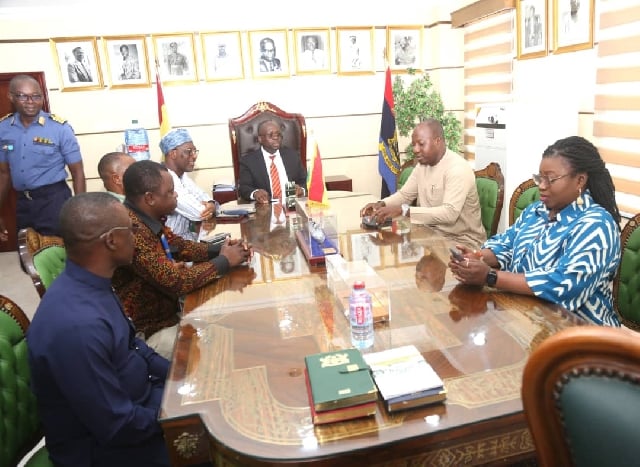The escalating security concerns in Bawku, a town grappling with protracted conflict, prompted a high-level security meeting convened by Defence Minister Dr. Edward Omane Boamah on Wednesday, February 12, 2025. The meeting, held at the Ministry of Defence, brought together key stakeholders including Interior Minister Muntaka Mubarak, Chief of the Defence Staff, Majority Leader Mahama Ayariga, and other Members of Parliament. The central focus of the discussions revolved around the persistent unrest in Bawku and the government’s strategic approach to resolving the crisis. Dr. Omane Boamah underscored President John Dramani Mahama’s unwavering commitment to implementing a comprehensive roadmap for peace, emphasizing a reliance on traditional conflict resolution mechanisms and dialogue as the primary tools for achieving lasting stability. He reassured the public that the government’s efforts were aligned with the President’s pledge to prioritize these time-honored approaches.
The Defence Minister’s pronouncements during the meeting served to reinforce the government’s resolve in tackling the Bawku conflict and restoring normalcy to the affected communities. He reiterated the administration’s dedication to ensuring peace and stability, not just in Bawku, but also in other areas grappling with similar challenges. Dr. Omane Boamah emphasized the continuous efforts of security agencies in addressing the crisis, assuring residents that their safety and well-being remained paramount. This high-level gathering served as a platform to coordinate strategies and reaffirm the collective commitment to finding sustainable solutions to the protracted unrest. The meeting symbolizes the government’s proactive stance in addressing national security concerns and its determination to prevent further escalation of violence.
The Bawku conflict, with its deep-rooted historical and socio-political complexities, has plagued the region for years, disrupting lives and hindering development. The government’s chosen path of engaging traditional authorities and facilitating dialogue reflects a recognition of the importance of local ownership in peacebuilding processes. Traditional mechanisms, deeply embedded within the cultural fabric of the community, often hold greater legitimacy and influence in mediating disputes and fostering reconciliation. By prioritizing these traditional avenues, the government aims to build trust and create a more conducive environment for sustainable peace. The involvement of key government officials and legislators in the meeting highlights the seriousness with which the administration is approaching the Bawku situation.
The comprehensive roadmap alluded to by Dr. Omane Boamah likely encompasses a multi-pronged approach, addressing not only the immediate security concerns but also the underlying causes of the conflict. This may involve initiatives focused on inter-communal dialogue, mediation efforts led by respected traditional leaders, and socio-economic development programs aimed at addressing grievances and fostering reconciliation. The long-term success of these initiatives will depend on the genuine commitment of all stakeholders, including the warring factions, community leaders, and the government. The ongoing engagement and collaboration between various actors demonstrate a concerted effort to navigate the complexities of the conflict and achieve a lasting resolution.
The security meeting within the context of the Bawku conflict represents a critical step in the government’s ongoing efforts to enhance national security and address long-standing conflicts. By bringing together key decision-makers and stakeholders, the government aims to strengthen coordination, streamline strategies, and ensure a unified approach to resolving the crisis. The meeting serves as a testament to the Mahama administration’s commitment to prioritizing peace and security within the national agenda. The emphasis on dialogue and traditional mechanisms underscores a recognition of the need for inclusive and culturally sensitive approaches to conflict resolution.
The government’s determination to restore peace and stability in Bawku is not only essential for the well-being of the affected communities but also for the overall stability and development of the nation. Protracted conflicts not only cause human suffering but also have a detrimental impact on economic growth, social cohesion, and national unity. By addressing the root causes of the Bawku conflict and investing in sustainable peacebuilding initiatives, the government is laying the groundwork for a more secure and prosperous future for all Ghanaians. The high-level security meeting, a vital component of this broader effort, symbolizes the commitment to collaborative action and the pursuit of lasting peace.


